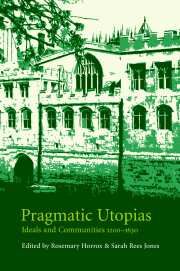Book contents
- Frontmatter
- Contents
- Preface
- List of abbreviations
- Richard Barrie Dobson: an appreciation
- 1 ‘If heaven be on this earth, it is in cloister or in school’: the monastic ideal in later medieval English literature
- 2 The ‘Chariot of Aminadab’ and the Yorkshire priory of Swine
- 3 Godliness and good learning: ideals and imagination in medieval university and college foundations
- 4 Hugh of Balsham, bishop of Ely 1256/7–1286
- 5 A cruel necessity? Christ's and St John's, two Cambridge refoundations
- 6 Coventry's ‘Lollard’ programme of 1492 and the making of Utopia
- 7 Thomas More's Utopia and medieval London
- 8 Social exclusivity or justice for all? Access to justice in fourteenth-century England
- 9 Idealising criminality: Robin Hood in the fifteenth century
- 10 Fat Christian and Old Peter: ideals and compromises among the medieval Waldensians
- 11 Imageless devotion: what kind of an ideal?
- 12 An English anchorite: the making, unmaking and remaking of Christine Carpenter
- 13 Victorian values in fifteenth-century England: the Ewelme almshouse statutes
- 14 Puritanism and the poor
- 15 Realising a utopian dream: the transformation of the clergy in the diocese of York, 1500–1630
- Bibliography of Barrie Dobson's published works
- Index
14 - Puritanism and the poor
Published online by Cambridge University Press: 01 July 2009
- Frontmatter
- Contents
- Preface
- List of abbreviations
- Richard Barrie Dobson: an appreciation
- 1 ‘If heaven be on this earth, it is in cloister or in school’: the monastic ideal in later medieval English literature
- 2 The ‘Chariot of Aminadab’ and the Yorkshire priory of Swine
- 3 Godliness and good learning: ideals and imagination in medieval university and college foundations
- 4 Hugh of Balsham, bishop of Ely 1256/7–1286
- 5 A cruel necessity? Christ's and St John's, two Cambridge refoundations
- 6 Coventry's ‘Lollard’ programme of 1492 and the making of Utopia
- 7 Thomas More's Utopia and medieval London
- 8 Social exclusivity or justice for all? Access to justice in fourteenth-century England
- 9 Idealising criminality: Robin Hood in the fifteenth century
- 10 Fat Christian and Old Peter: ideals and compromises among the medieval Waldensians
- 11 Imageless devotion: what kind of an ideal?
- 12 An English anchorite: the making, unmaking and remaking of Christine Carpenter
- 13 Victorian values in fifteenth-century England: the Ewelme almshouse statutes
- 14 Puritanism and the poor
- 15 Realising a utopian dream: the transformation of the clergy in the diocese of York, 1500–1630
- Bibliography of Barrie Dobson's published works
- Index
Summary
The puritan response to poverty, which was, or should have been, the dominant concern of anyone with a liability or concern for social policy in the late sixteenth and early seventeenth centuries, combined elements of utopianism and pragmatism, making it a subject especially worthy of inclusion in a collection of tributes to Barrie Dobson. But this is no new subject. Nearly half a century ago, Christopher Hill published an essay on the most representative of puritan divines, ‘William Perkins and the Poor’. Hill read Perkins selectively, and suggested that so did Perkins's original readers. They would have filtered out, as he filtered out, the hard things that Perkins, as a representative Puritan, had to say about the spiritual peril of riches, and about the obligation of those with means to do so to give without stint. Hill believed that the sixteenth and seventeenth centuries witnessed a drastic change in social attitudes, one which was favourable to the proto-capitalist ethic. 'To be sure he did not have to invent the fervour with which puritan preachers and writers castigated work-shy idleness. But this was not all that the Puritans had to say on the subject of poverty and how Christians should respond to it, and much of it, as John Walsh has remarked of John Wesley's doctrine and practice in the eighteenth century, was ‘not the stuff of which the capitalist ethic is easily constructed’.
- Type
- Chapter
- Information
- Pragmatic UtopiasIdeals and Communities, 1200–1630, pp. 242 - 258Publisher: Cambridge University PressPrint publication year: 2001



